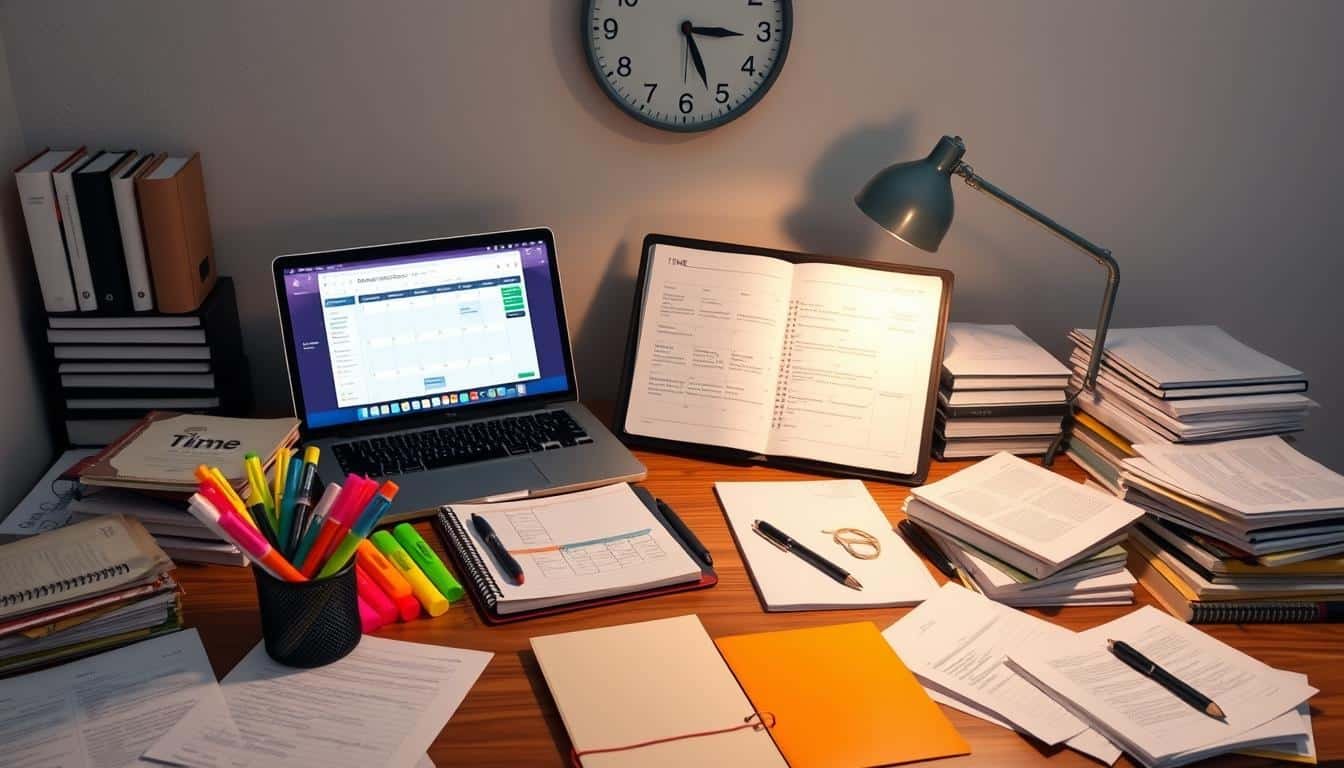Managing your time well is key for students and professionals. The term “time management” might seem odd, but it’s really about controlling what you do with the time you have. By using effective strategies, you can do more, feel more energized, and cut down on stress. This guide will give you tips to manage your exam time better and reach your goals.
Also Read: Best Study And Exam Preparation Tips For Students
Key Takeaways
- Effective time management is about managing events and activities in relation to available time.
- Implementing time management strategies can boost productivity, energy, and reduce stress.
- Practical exam time management strategies can help you make the most of your time and achieve your goals.
- Prioritizing tasks and differentiating between urgent and important activities is crucial.
- Utilizing planning tools and apps can improve organization and information processing.
Understand the True Meaning of Time Management
The term “time management” is often misunderstood. It’s not about controlling the 24 hours we all have each day. Time management is about making the most of the time you have by managing your events, activities, and responsibilities. This understanding helps you develop strategies to reach your goals.
Also Read: The Ultimate Guide To The Best Study Techniques For Exams
Experts say that good time management techniques lead to more productivity, more energy, and less stress. This is because effective time management helps you focus on important tasks, reduce distractions, and balance work and personal life.
Time Management is About Managing Events in Relation to Time
Time management is all about organizing your daily tasks and responsibilities. It means setting goals, breaking tasks into smaller parts, and giving each one the right time and resources.
Effective Time Management Leads to Increased Productivity, Energy, and Reduced Stress
Mastering time management brings many benefits. With a clear plan and focus on what’s important, you’ll do more in less time. You’ll also have more energy and less stress as you balance work and personal life better.
Also Read: How Effective Are Mock Exams For SAT Preparation?
“Time management is not about getting more things done in a day, but about getting the right things done.” – Unknown
Set Priorities and Differentiate Between Urgent and Important Tasks
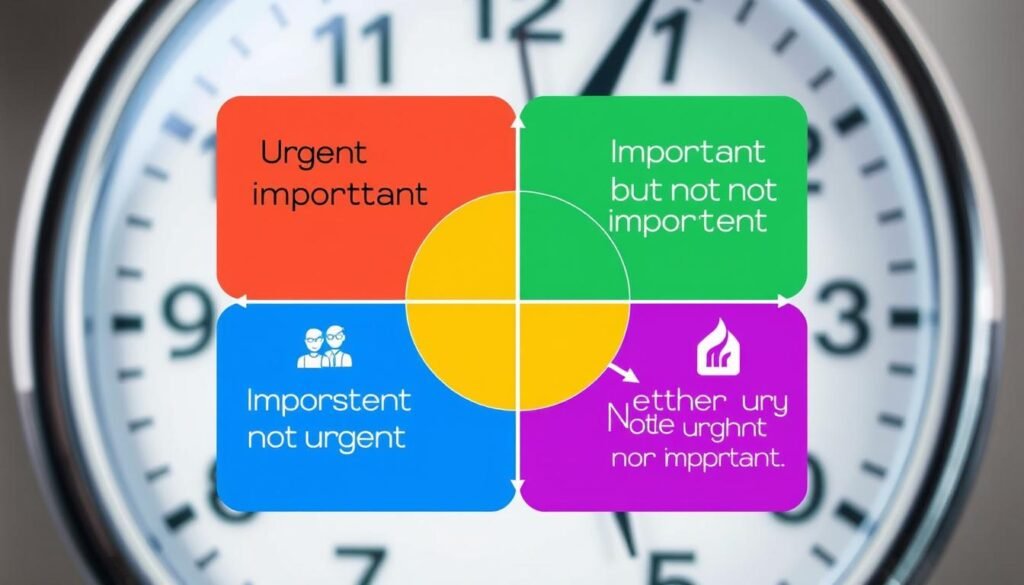
Effective time management starts with knowing what to do first. Experts suggest making a detailed “to-do” list. Then, sort each task by its importance and urgency. This method helps you focus on what’s really important and skip the less important tasks.
The Time Management Matrix is a great tool for sorting tasks. It was created by experts like Stephen Covey and Alec Mackenzie. This matrix puts tasks into four groups: urgent and important, not urgent but important, urgent but not important, and not urgent and not important. By focusing on tasks that are important but not urgent, you can manage your time better and avoid last-minute crises.
Also Read: How To Avoid Exam Stress?
Prioritize Your Tasks
- Create a detailed “to-do” list that includes both school and personal tasks.
- Sort each task by its importance and urgency.
- Work on the most critical tasks first.
Utilize the Time Management Matrix
| Quadrant | Description | Example Tasks |
|---|---|---|
| Urgent and Important | Tasks that need quick action and are very important. | Getting ready for an exam, answering a professor’s urgent email. |
| Not Urgent but Important | Tasks that are crucial but don’t have a deadline. | Creating a study plan, looking into career options. |
| Urgent but Not Important | Tasks that need quick action but don’t matter much. | Checking social media, going to a sudden meeting. |
| Not Urgent and Not Important | Tasks that don’t need quick action and don’t have much impact. | Watching videos not related to school, browsing social media. |
By setting priorities and using the Time Management Matrix, you can decide how to spend your time wisely. This leads to more productivity and less stress during exams.
Also Read: How To Prepare For Final Exams?
Utilize Planning Tools and Apps
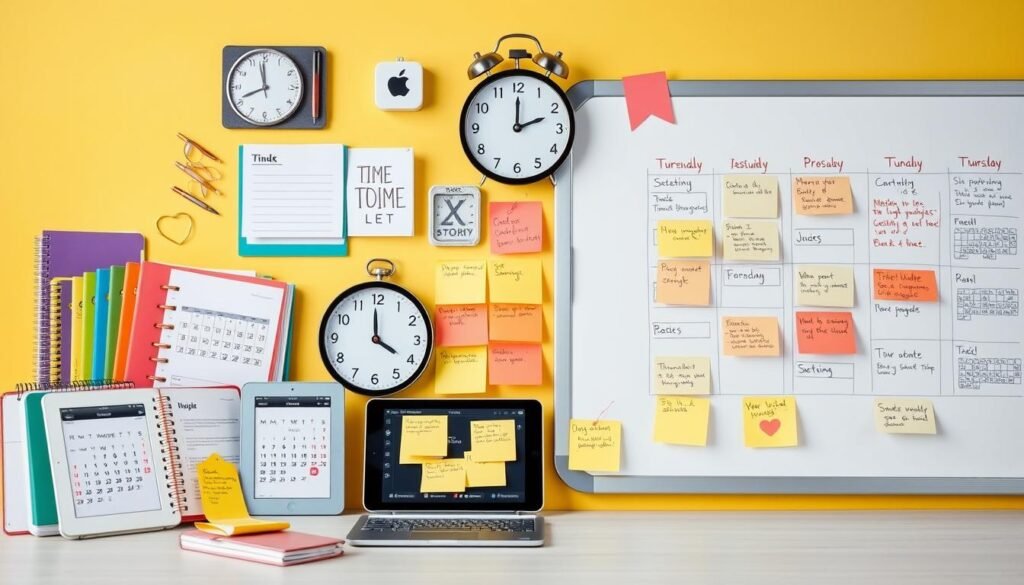
In today’s digital world, experts suggest using planning tools and productivity apps to get more done and stay organized. You can choose from paper or digital planning solutions based on what works best for you. The goal is to find a tool that fits your style and how you learn.
There are many time management tools and digital planning apps out there to help you. They can help you plan your schedule, set priorities, and increase your productivity. Tools like time trackers, task managers, and platforms for building habits can really change the game in your study routine.
Using your planning tools across all devices can be super helpful. It keeps your schedule, priorities, and to-do lists in sync. This way, you can keep track of your commitments and use your time wisely.
Explore the Benefits of Popular Productivity Apps
Here are some top productivity apps that can make managing your time and improving your exam scores easier:
- Trello – A versatile project management tool that lets you see your tasks and deadlines clearly.
- Pomodoro Technique – A method that involves focused 25-minute work sessions with short breaks in between.
- Todoist – A detailed task management app that helps you organize your to-do list and keep track of your tasks.
- Forest – A tool that helps you avoid distractions by keeping you focused on your work.
By adding these time management tools and productivity apps to your study routine, you can better manage your time, work more efficiently, and see better results.
“The key to time management is not in doing more, but in doing what matters most.” – Brian Tracy
Get Organized and Improve Information Processing
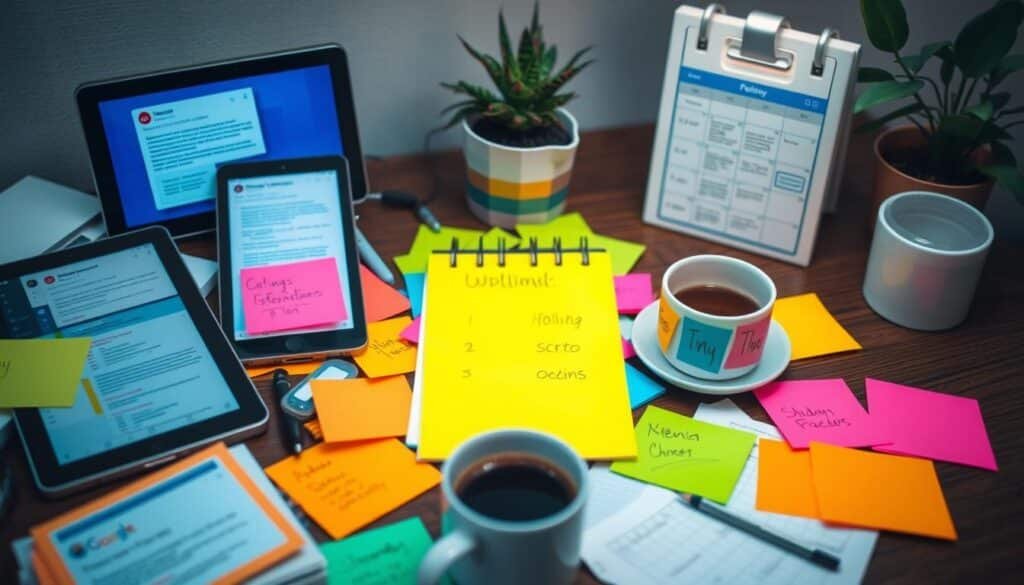
Being organized is key to managing time well and feeling less stressed. It’s important to work on both your digital and physical spaces.
Implement an Email Organization System
Emails can take up a lot of time. To take back control, set up a good email system. Use folders, flags, and colors to sort and prioritize your emails. This makes you get organized and helps you handle emails better, letting you answer important ones quickly.
Declutter Your Environment
Clutter can distract you and make it hard to focus. Take time to declutter your area, getting rid of things you don’t need. A clean space helps you concentrate better and think clearer, which is good for time management.
Getting your emails and space organized is key to doing well in exams. With a good email system and a tidy area, you’ll work more efficiently and do better in school.
“A clean desk is a sign of a cluttered desk drawer.” – Albert Einstein
Exam Time Management Strategies: Schedule Effectively
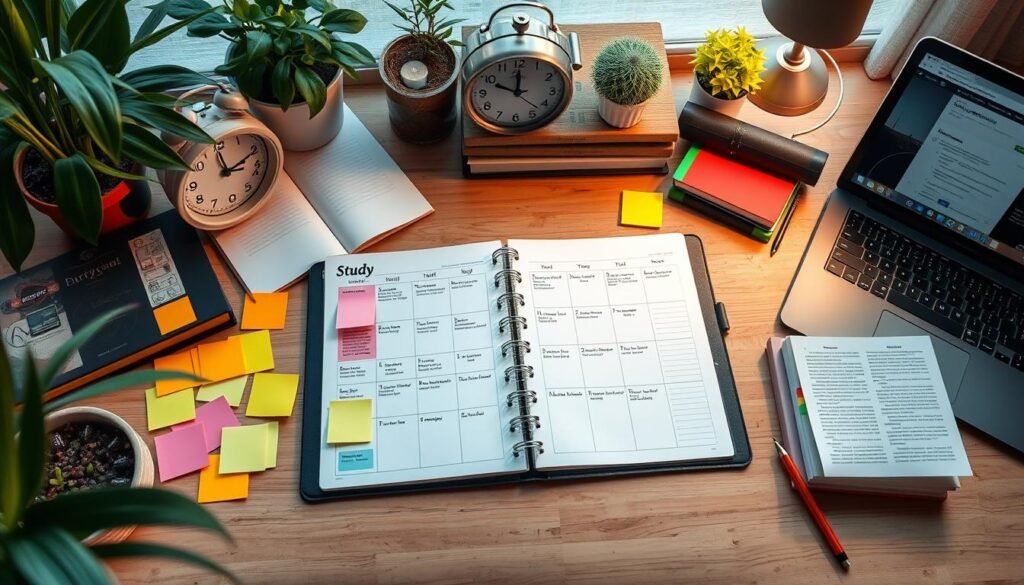
During exam periods, managing your time well is key. You have many deadlines and a lot to do. Focus on scheduling smartly and using your time wisely to boost your productivity and cut stress.
Block Time for High-Priority Activities
First, set aside specific times in your calendar for your most important tasks. This could be studying for crucial subjects or finishing big assignments. See these times as set in stone and keep them free from distractions. This way, you can give your full attention to what matters most for your exams.
Capitalize on Otherwise Wasted Time
Don’t forget to use time you might otherwise waste. For instance, use your travel time to listen to educational podcasts or go over flashcards. When you’re waiting, like before a meeting, do some small tasks or check your study notes. Using these moments wisely can help you get more done and prepare better for your exams.
| Time Management Strategy | Description | Benefits |
|---|---|---|
| Block Time for High-Priority Activities | Dedicate specific time slots in your calendar for studying, completing assignments, and other critical tasks. | Ensures you can focus without interruptions, maximizing the impact of your efforts. |
| Capitalize on Otherwise Wasted Time | Utilize commute time, waiting periods, and other “downtime” to engage in productive activities like reviewing materials or listening to educational content. | Helps you make the most of every minute, increasing your overall productivity and efficiency. |
“Time management is not just about getting more things done; it’s about getting the right things done.” – Jeannie Wong
By using these strategies for managing your time during exams, you can prepare better and boost your chances of doing well on test day. Remember, good scheduling and making the most of your time are key to doing well during exams.
Delegate Tasks and Buy Time

When managing your time for exams, it’s key to know when to pass tasks to others. This lets you save time and focus on what’s most important, like studying and getting ready for exams.
Identify Tasks Others Can Accomplish
Look at what you do every day and see what others can do instead. This might be cleaning, shopping, or handling paperwork. Passing on these tasks helps you focus more on studying for your exams.
Hire Time-Saving Services
Think about getting help with things that take up a lot of your time. This could be a cleaning service, someone to take care of your lawn, or meals delivered to your door. These outsourcing options might cost money, but they save you time. This lets you spend more time on studying and taking care of yourself.
“Effective time management is about working smarter, not harder. By delegating tasks and utilizing time-saving services, you can free up precious time to focus on the most important aspects of your exam preparation.”
Being strategic with your time is key to doing well in exams. Passing on tasks and outsourcing can really help. They let you use your time better and reach your academic goals.
Stop Procrastinating and Manage Time-Wasters

Procrastination and wasting time can really slow you down, especially when you’re getting ready for exams. To beat these issues, try using strategies that keep you focused and productive.
Utilize the “Eat the Frog” or “Snowball” Techniques
The “eat the frog” method means you tackle your toughest task right when you wake up. The “snowball” technique breaks big tasks into smaller bits. Doing this helps you avoid putting things off and keeps you moving towards your goals.
Reduce Time Spent on Devices, Emails, and Other Distractions
Being always connected to our devices and emails can really slow us down. To take back control, set limits on these activities. Turn off notifications and pick specific times for checking emails and social media. Cutting down on distractions lets you focus more on studying and other important stuff.
By fighting off procrastination and managing distractions, you can do better in your exams. Try using “eat the frog” and “snowball” methods, and reduce digital distractions. This will boost your productivity techniques a lot.
| Time-Wasting Activities | Productivity Techniques |
|---|---|
| Excessive social media use | Scheduled social media breaks |
| Constant email checking | Dedicated email checking times |
| Binge-watching TV shows | Time-limiting entertainment |
| Procrastinating on important tasks | Using the “eat the frog” or “snowball” methods |
Also Read: How To Register For The CLEP Exam: A Complete Guide
Conclusion
Learning how to manage your time well is key for students to do their best and succeed in school. It means understanding what time management is, setting what’s important, and using tools and apps to help. It also means staying organized, planning your time well, sharing tasks with others, and beating procrastination.
This approach helps you use your time wisely and feel ready for exams. It’s not about controlling the time you have, but making the most of what you do. By using the tips from this guide, you can take control of your time and improve your exam scores.
For exam time management, it’s important to have a full plan for your school life. This includes deciding what’s most important and avoiding distractions. The tips in this article will help you do well in school and succeed with your effective study strategies.
FAQs
Q: What are some effective time management tips for exam preparation?
A: Effective time management tips for exam preparation include creating a study schedule, allocating specific time slots for each subject, and incorporating regular breaks to recharge your mind. This approach helps you manage your time effectively and prevents burnout.
Q: How can I allocate my time during exams to perform my best?
A: To allocate your time during exams effectively, begin by reviewing the exam structure. Divide the total amount of time by the number of questions. This will help you determine how much time to spend on each question, allowing you to stay on track and manage your time effectively.
Q: What should I do if I encounter difficult questions during an exam?
A: If you encounter difficult questions, don’t panic. First, take a moment to breathe and assess the question. If it’s challenging, allocate a reasonable amount of time to it and then move on to other questions. You can always come back to it later if time permits.
Q: How can I create a study schedule that helps me stay on track?
A: When creating a study schedule, start by identifying what you want to achieve in each study session. Allocate time for each topic, including breaks for recharging. Ensure that you review your answers regularly to keep your study sessions efficient and effective.
Q: What role does practice play in effective time management during exams?
A: Practice is crucial for effective time management during exams. Taking practice tests helps you simulate the exam environment, allowing you to navigate through questions within the given time and build confidence in your ability to manage your time effectively.
Q: How can I prevent burnout while studying for exams?
A: To prevent burnout, it’s important to take regular breaks during your study sessions. Recharge your mind by stepping away from your study materials, engaging in a different activity, or simply relaxing. This will help you maintain concentration and overall performance.
Q: What is the first step in managing my time more effectively for exams?
A: The first step in managing your time more effectively for exams is to create a detailed timetable that outlines your study sessions. This should include specific goals for each session, ensuring that you cover all relevant topics before the exam date.
Q: How can I ensure I don’t waste time during the exam?
A: To avoid wasting time during the exam, read through all the questions first and identify which ones you can answer quickly. Write your answer neatly and efficiently, and keep an eye on the clock to help you stay on track throughout the exam.
Q: What are some tips for revising effectively before the exam?
A: Some tips for revising effectively include breaking down the material into manageable chunks, using keyword memorization techniques, and practicing with past papers. This approach will help you retain information better and boost your confidence as the exam approaches.
Q: How can I find what works best for my time management during exams?
A: To find what works best for your time management, experiment with different study techniques and schedules. Take some time to reflect on your study habits and adjust your timetable based on what helps you concentrate and perform your best during practice tests.
Source Links
- https://extension.uga.edu/publications/detail.html?number=C1042&title=time-management-10-strategies-for-better-time-management
- https://jdadvising.com/ultimate-bar-exam-time-management-tips-to-boost-your-study-efficiency/
- https://summer.harvard.edu/blog/8-time-management-tips-for-students/
